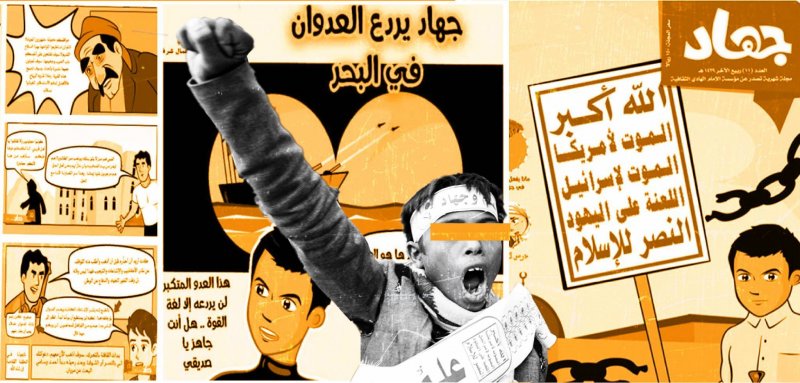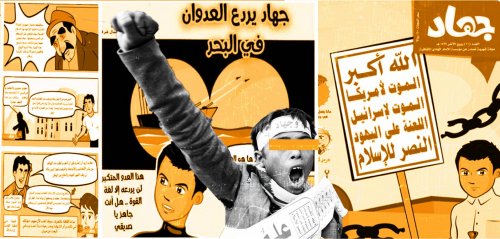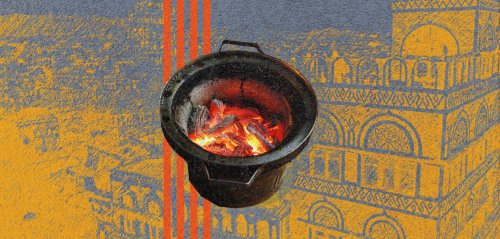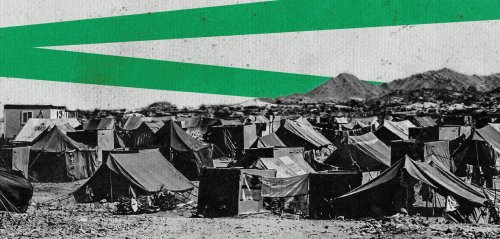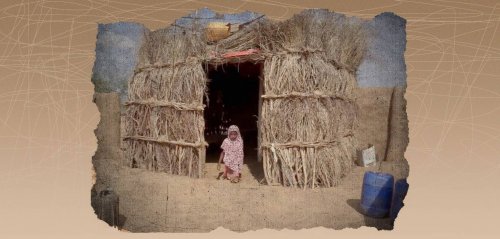“While my children were out playing in the yard, I was startled by loud voices yelling and shouting: ‘Allahu Akbar. Death to America. Death to Israel. Curse upon the Jews. Victory for Islam’. I rushed to see what was happening, and I was shocked by the sight of my children carrying plastic weapons, holding them up with their tiny hands and shouting slogans of the Houthi group, and imitating the way the group's fighters celebrate after making any progress on the fronts.”
These are the words of a father whose child goes to school in a Houthi-controlled area. He tells Raseef22, "When I asked one of my sons, who is only 12 years old, 'Where did you learn this chanting and these actions?' He answered, ‘We recite this slogan every day in the morning assembly at school’.”
The father, who is an expatriate in the Gulf, was on his first visit to Yemen for the first time in many years. He learned from his conversation with his son that students celebrate “Yawm al-Sarkha” (the Day of the Scream) every year, in which they are told about the slogan of “al-Sarkha” and its connotations, and are taught of “the necessity of repeating it to avoid infidels and hypocrites”.
The father was shocked by “this huge amount of negative influence" on the mentality and consciousness of his children. He says, “Frankly, I am afraid that my children will lose their proper upbringing if we do not take more care in their upbringing at home, and focus on raising them properly, in order to protect them from being affected by these distorted and extremist ideas.”
Last August, the text of an official document, issued on the 22nd of that month by a government agency, the Education Office of the Ansarullah Houthi group, directed school principals in the areas under their control of the need to have students chant the slogan of “al-Sarkha”, which has been the slogan of the group since its inception.
The document stated: “Based on the words of the Almighty {‘…whenever they suffer from thirst, fatigue, or hunger in the cause of Allah; or tread on a territory, unnerving the disbelievers; or inflict any loss on an enemy—it is written to their credit as a good deed. Surely Allah never discounts the reward of the good-doers.’ (120) }, and our faith in God and the truthfulness of His words, which requires us to raise the cry in the face of the tyrants and oppressors, led by America and Israel and their lackeys after the truth became clear, and out of our keenness to instill the values and culture of faith in the hearts of our sons and daughters in school, the principals of public and private schools are hereby instructed to implement the “al-Sarkha” slogan in the school morning queue, after reciting the national anthem and saluting the flag, to be enforced throughout the school year."
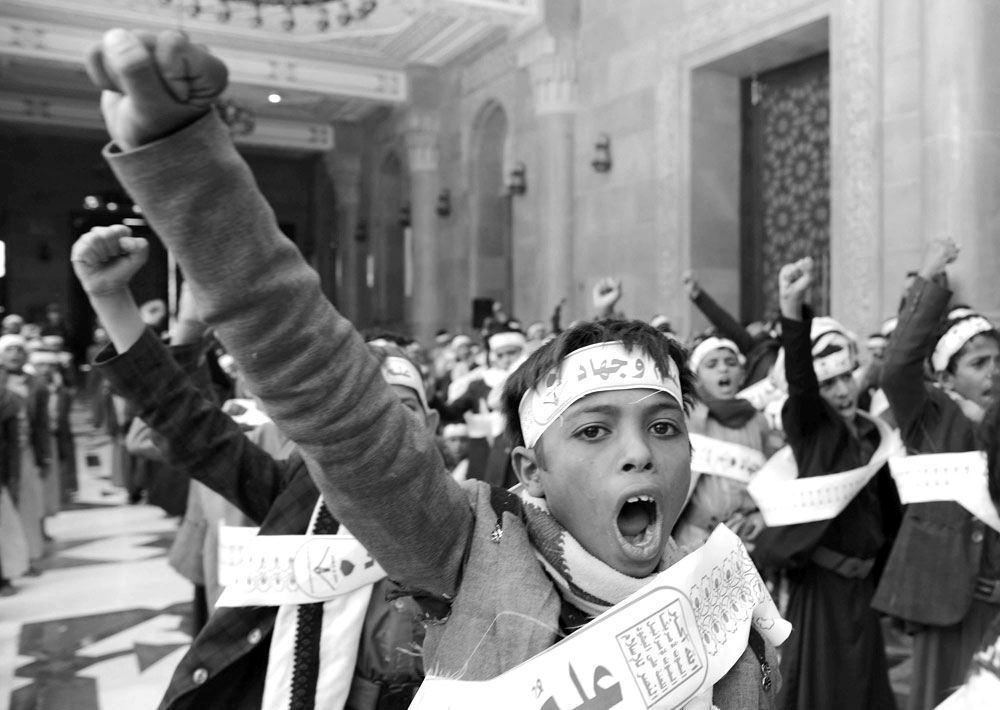
Many of the students’ parents we spoke with mentioned that their children were affected, in one way or another, by practices taking place in schools. Some even reported that their children ran away from home and joined the battlefronts without their consent, influenced by what is happening in schools and summer centers.
Using schools for recruitment
Schools in areas controlled by the Ansarullah Houthi group have turned into platforms used for jihadist mobilization and to spread the group's ideas. According to a supervisor working in a school in the capital Sana'a, the topics of the daily school broadcasts are distributed weekly to schools, which are obliged to discuss and present them, and they "often talk about the ideas of the Houthis and their fanatical political and religious orientations.”
In a public school located on the outskirts of Sana'a, the students were surprised by a delegation from the Houthi-affiliated Ministry of Education who came to announce the general mobilization and to “educate students” about “jihad” and urge them to participate in fighting on the frontlines. A member of this delegation climbed the platform of the school and shouted at the top of his voice to the students, most of whom were only 16 years old, "There’s no good in education and study. This period needs fighters on the frontlines, not students in schools." He continued addressing them for about two hours, and at the end of his speech he told them that forms would be distributed to the students to join his armed group, to fight on one of the raging frontlines in Yemen.
To encourage students more to engage in combat and join the frontlines, the recruits and the wounded are exempted from attending classes altogether, and at the end of the school year, specialized tests are prepared for them to take at a different time, often after the official date for the rest of the students, and all of these students are known to receive high marks.
While visiting a public school on the outskirts of Sana'a, a member of a delegation from the Houthi-affiliated Ministry of Education took the podium and yelled out to the students: "There’s no good in education and study. This critical stage needs fighters"
Every year, during the period from 13 to 20 of the month of Jumada al-Awwal (December 7-14), the Houthis mark what they call "Martyr's Week," turning Sana'a, with all its streets, squares, government institutions, and other public places, into something like an open tent for mourning.
Of course, schools are no exception, as they are required to celebrate this occasion. Pictures of the dead are hung on their walls, and school broadcasts are dedicated to talking about "martyrs" and the virtue of "martyrdom", with a focus on encouraging students to follow their example, by engaging in combat, "jihad", and self-sacrifice in order to defeat what they call "global arrogant countries".
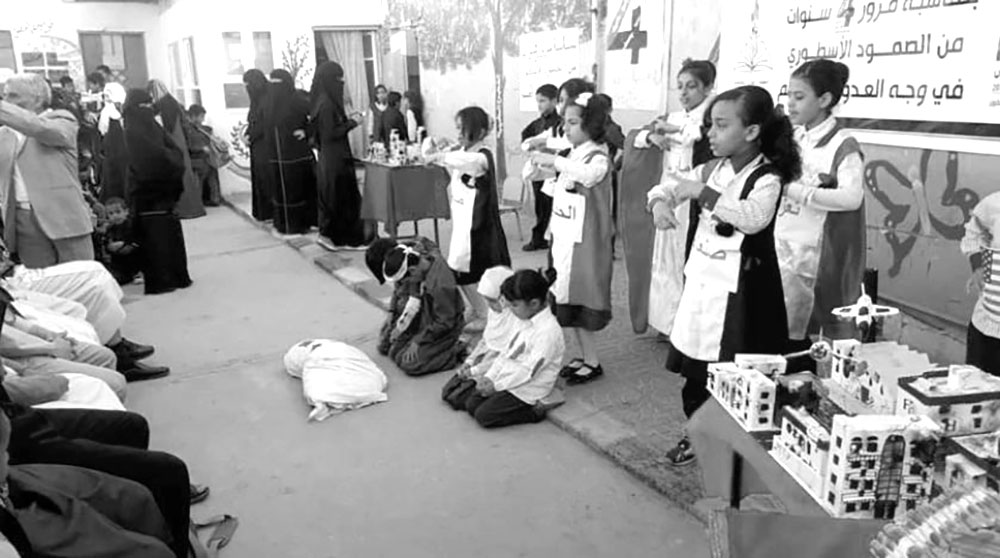
School trips are also organized to visit the grave of Saleh al-Samad, the former head of the Houthi-affiliated Supreme Political Council (SPC) and his companions, who were killed in an airstrike that targeted his car. This tomb was placed under the monument of the Unknown Soldier, which was erected in memory of the "martyrs" of the 26 September Revolution in 1962.
Also, school students go to visit the "Martyrs' Exhibition", which is held annually in al-Sabeen Square, in the center of Sana'a, and contains pictures of hundreds of dead Houthi fighters who fell on the frontlines, including hundreds of children.
One student in the sixth grade mentioned that the Arabic language teacher had assigned him and his colleagues to prepare an essay topic on the occasion of the "Martyr's Week", in which they would talk about the life of fallen martyrs from their families or the neighborhoods they live in. He also asked them to bring printed photos of the martyrs they will talk about, in order to hold a mini-exhibition for them at the school.
The obliteration of national identity
On the other hand, national holidays pass by completely unnoticed, so much so that many school students no longer know what these national holidays are and what they are celebrated for. This has led some to express their fear of weakening the national belonging of new generations and obliterating their common national identity.
The above is just the tip of the iceberg of what students are required to celebrate. In addition to celebrating “Yawm al-Sarkha” and “Martyr’s Week”, schools commemorate al-Wilaya Day, the death anniversary of Houthi leader Hussein Badreddin al-Houthi, the death anniversary of Saleh al-Samad, and other religious and political events for the Houthis.
Teachers who are loyal to the Houthis advise their students to follow the "Jihad" magazine, which is published monthly by a Houthi-affiliated institution. As its name suggests, it focuses on encouraging jihad with appealing images and illustrations
When we went to talk to a teacher at a school, he told us about a practical experience he decided to try out; The teacher asked his students in the sixth grade of primary school about Evacuation Day which falls on November 30, and about the revolutions of September 26 and October 14, but no one knew.
The teacher says that this is a natural result, as students in this school level and below had entered schools during the period when the Houthis had seized power in most areas of northern Yemen, where focus was centered on religious holidays at the expense of national holidays, whether in school curricula or through practices that occur during the educational process.
He comments, "I am really concerned about the danger of this for the current generation of children who live in an environment where everything invites them to violence and fanaticism, an environment where they absorb extremist ideas, and grow up lacking national loyalty and normal moderate thought.”
"Jihad", the children’s magazine
In addition to regular schools, the Houthis have launched summer centers and schools. In the summer of 2022 alone, they set up about six thousand summer centers in 15 Yemeni governorates that are wholly or partially under their control, along with the participation of 24,000 teachers, with a focus on jihadist mobilization and passing on the political and religious ideas of Houthis.
The Houthi-affiliated Imam al-Hadi Cultural Foundation also published a monthly children's magazine called “Jihad”. As its name suggests, it focuses on encouraging jihad with appealing images and illustrations. The magazine is published in two versions, one for the age group of four to nine years, and the other for the age group of ten to 16 years.
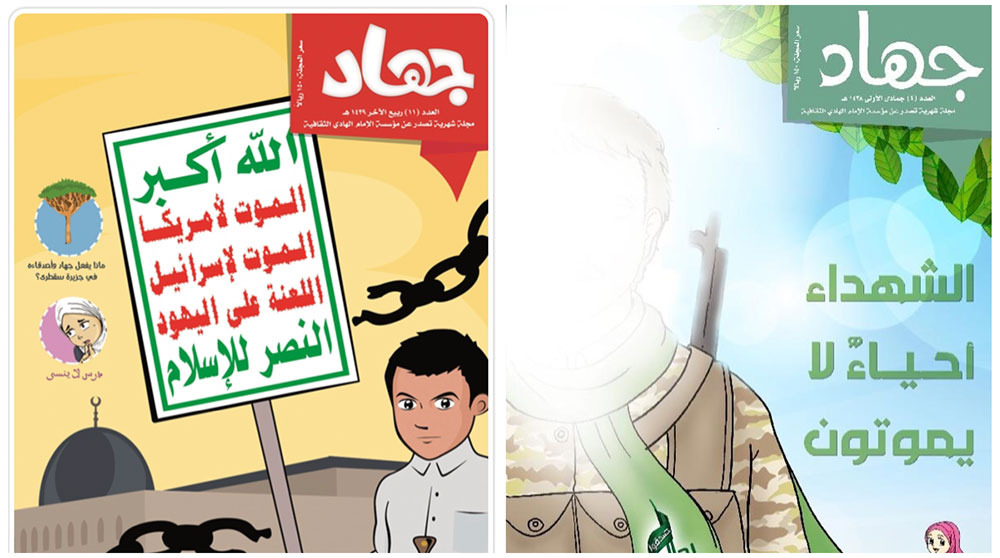
According to a report by the Institute for Monitoring Peace and Cultural Tolerance in School Education (IMPACT-se), "The magazine thinly veils its radical ideological material, by providing useful scientific information and neutral content, such as science and astronomy lessons, drawing lessons and math exercises. But much of the magazine focuses on the importance of jihad, depicting children fighting in battle, planning attacks or appealing to their families to let them go to the frontlines to repel the 'aggression' threatening their country. The magazine also offers content full of violence and hostility to ‘The Other’, in which all opponents of the Houthis are portrayed as immoral monsters. Those who are not involved in war and seek peace are also portrayed as weak defeatists."
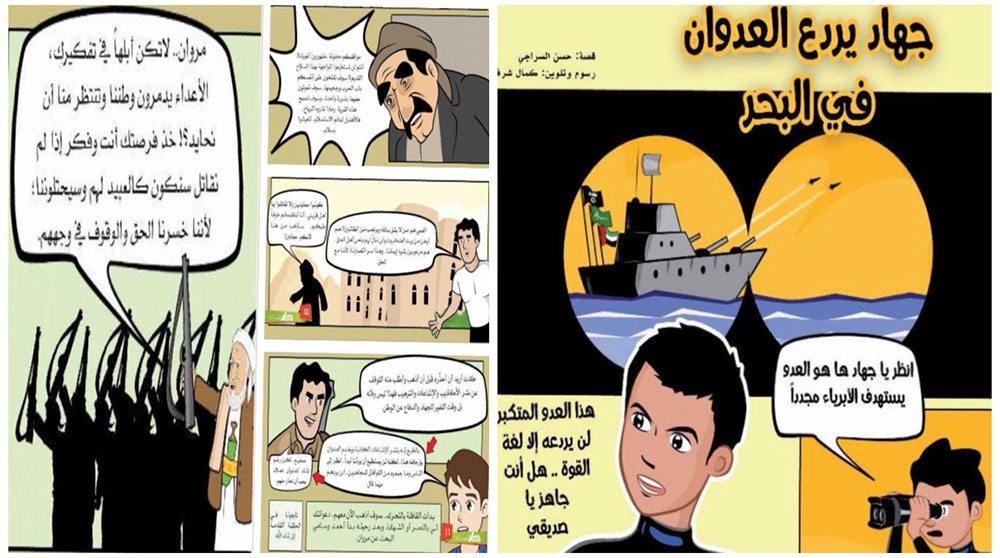
Teachers who are loyal to the Houthi group frequently advise students to read this magazine when explaining their lessons, especially those related to jihad and fighting. It is distributed in schools, libraries, and kiosks in all areas under Houthi control, and is also available online in electronic format, free of charge.
Starting from the current academic year, the Houthis have introduced boarding schools, one of which is located in the Great Mosque of Old Sana'a. It adopts a strange school system, according to which the number of academic years is reduced to half, and classes are given inside the mosque in circles and groups such as those dedicated for dhikr and reading the Qur'an. Most of the teachers at this school do not have university degrees, but rather come from Houthi-affiliated religious centers.
This school focuses more on teaching religious subjects based on the Zaydi sect, and is described as religious, but it is affiliated with the Ministry of Education and grants official certificates accredited by the competent authorities, which are under Houthi control, as if it were one of the other schools affiliated with the ministry.
Arbitrary practices
To ensure that their directives are implemented and their curriculum adhered to, the Houthis have dismissed a large number of school principals and teachers whose loyalty was questioned and replaced them with others who support them.
Salma Ahmad has been an Islamic education teacher at a school in Ibb Governorate for more than ten years. But she was surprised when she was suddenly suspended from work and summoned to the education office in the governorate for interrogation. In the interrogation, it was revealed that her charge was that, while explaining a lesson about Muawiyah bin Abi Sufyan in one class she had said: "may Allah be pleased with him".
Salma recounts to Raseef22, "They described me as an 'ISIS' supporter who promoted the ideas of 'mercenaries' (meaning forces opposed to them)." After the investigation, which she described as "farcical", she was arbitrarily dismissed and denied her rights as a teacher.
The person who reported Salma is one of her students from a pro-Houthi family. A colleague who still works in the same school mentions that they’re now working under severe pressure, making sure they watch every action or word that comes out of their mouths, so that they would not meet the same fate as their colleague, especially since they are in dire need of work, in light of the difficult economic conditions that Yemenis are experiencing.
Bilal al-Issawi, who used to work for the Ministry of Education, specifically on the preparation and review committee for school curriculums, was also arbitrarily dismissed after objecting to some changes in the curriculum they had asked him to make.
Al-Issawi tells Raseef22, "First they suspended me from work and referred me to investigation, and in the investigation they asked me about my sectarian and political affiliations, and other questions about my relations with those they described as mercenaries. They said that my refusal of what they had asked me was 'national treason', not personal freedom. I felt that I was accused, arrested in a police station or national security, not in a department of the Ministry of Education. At the end of the interrogation, they told me that the results of the investigation would arrive in two weeks, and after only one week they permanently suspended me."
Despite these stressful circumstances, many of the teachers who spoke to us stated that they are trying as much as possible to mitigate the impact of the new curricula and what is happening in schools on the minds of students. However, according to them, what is happening is a systematic process, in which all active Houthi institutions, whether governmental or private, are involved, and they are not able to confront all of this alone.
Raseef22 is a not for profit entity. Our focus is on quality journalism. Every contribution to the NasRaseef membership goes directly towards journalism production. We stand independent, not accepting corporate sponsorships, sponsored content or political funding.
Support our mission to keep Raseef22 available to all readers by clicking here!
Interested in writing with us? Check our pitch process here!
